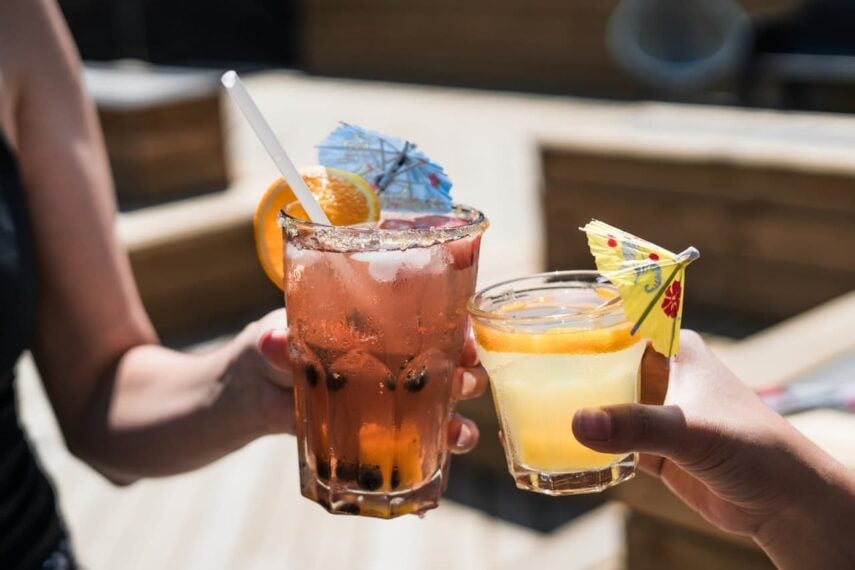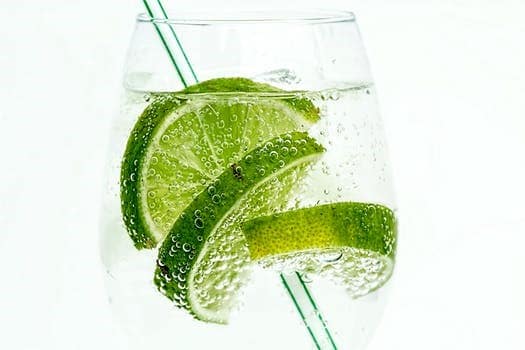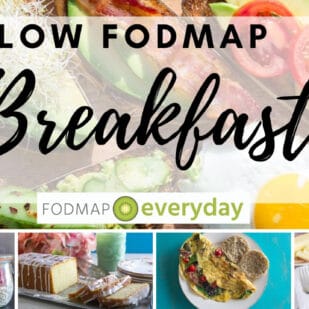Can You or Can’t You?
Feeling confused about drinking alcohol on the low FODMAP diet? Whether you like to enjoy an occasional drink or have an upcoming social event, it can be tricky knowing what fits into a low FODMAP diet.
For people without digestive issues, having a drink with friends or at the end of a long day is easy. In fact, so easy we take it for granted until faced with digestive conditions such as irritable bowel syndrome (IBS).
Learn how to safely add alcohol to your low FODMAP diet and ideas for what to order the next time you want to have a drink.

The Good News & The Bad News
I have some good news and bad news about alcohol and the low FODMAP diet. So, the good news is there are actually many low FODMAP options if you are looking to have a drink or two at a party or other social function.
The bad news is alcohol, in general, isn’t the best idea for those with digestive conditions such as IBS.
Alcohol is a gut irritant and can also act as a stimulant, which can be especially problematic for those with diarrhea prominent IBS, or IBS-D. Some people will have increased digestive symptoms no matter what they choose to drink.
Moderation Is Key
As you might expect to hear from a dietitian, moderation is usually the best idea when it comes to alcohol. One or two drinks during an evening party is a good guideline. To help avoid digestive upsets, try to consume alcoholic beverages with food.
Food will help slow down the release of alcohol from the stomach. Another way to reduce the risk of digestive symptoms is to alternate alcoholic beverages with water to stay hydrated.
Keeping A Clear Head = Keeping On Track
One of the problems that can occur from drinking too much alcohol is overeating foods containing FODMAPs. Since alcohol creates a feeling of relaxation, it can become easy to get carried away nibbling on snacks that might have high FODMAP ingredients.
You won’t be thinking as clearly and justify that it’s okay just this one time. The combination of alcohol and high FODMAP foods can really stir up IBS symptoms and make the next day unpleasant.
Top low FODMAP Alcoholic Drink Choices
The best way to avoid too many FODMAPs while drinking alcohol is to educate yourself and plan ahead. Learning what you can and cannot have on the low FODMAP diet and having an idea of what you can order before the situation occurs, will help set you up for success.
Here is a list of the alcohol choices that have been tested and are low in FODMAPs:
- Beer (12 ounces or 375 ml)
You might be surprised that beer makes the low FODMAP list since it’s often made from wheat, which contains fructans (a FODMAP). Beer is safe for those following a low FODMAP diet, but is not for anyone with celiac disease or gluten sensitivity unless it’s specifically labeled as gluten-free.
- Red, White, and Sparkling Wine (5 ounces or 150 ml)
Since there are many different types of wine, it’s important to watch which one you are consuming. Dessert wines such as port or marsala are high in fructose and therefore not a good choice for the low FODMAP diet. But most red, white, and sparkling wines are a good low FODMAP choice.
- Gin (1 ounce or 30 ml)
- Vodka (1 ounce or 30 ml)
- Whiskey (1 ounce or 30 ml)

Watch Your Mixers
Even though there are many good low FODMAP choices for alcohol, mixers used in making alcoholic drinks can cause problems for those following a low FODMAP diet. Some of the beverages commonly used in mixed drinks are fruit juices and regular or diet soda.
These beverages tend to be high in fructose, high fructose corn syrup, or sugar alcohols, which are all high FODMAP ingredients that can increase digestive symptoms.
Fortunately, there are better choices for low FODMAP mixers including cranberry juice that doesn’t contain high fructose corn syrup, club soda, and fresh lime, lemon, or orange juice.
The key is not to overdo it when adding mixers to drinks and limiting the number of mixed drinks.
Ideas for Drinks
Now that you have a better idea of which alcohol choices and mixers are safe, let me share my top three choices for low FODMAP drinks you can order or make yourself if you want to adventure outside of beer and wine.
- Gin Ricky (Gin + lime juice + club soda)
- Vodka Cranberry (Vodka + cranberry juice)
- Whiskey Sour (Whiskey, lemon juice, sugar)
You should now feel more prepared to take on your next social event, holiday dinner, or a relaxing drink at home. Remember that moderation is as important as choosing a low FODMAP beverage. Having a digestive disorder means that your tolerance to alcohol may be less than optimal, so try not to overdo it.
You should now feel more confident knowing that you won’t feel left out of the fun if you want to enjoy a drink even if you are following a special diet.
Looking for even more ideas! Check out our article All About Cocktails and Mocktails for endless possibilities!
References
Bode C and Bode JC. Effect of alcohol consumption on the gut Best Pract Res Clin Gastroenterol 2003 Aug;17(4): 575-92. Web. 28 Nov 2017.
Monash University Medicine, Nursing, and Health Sciences. Low FODMAP Smartphone App. www.med.monash.edu.au/cecs/gastro/fodmap/iphone-app.html, accessed December 6, 2017.
Reding KW et al. Relationship between patterns of alcohol consumption and gastrointestinal symptoms among patients with irritable bowel syndrome. Am J Gastroenterol 2013 Feb; 108(2): 270-6. Web. 20 Nov 2017.








thank you for the info.. if I want to have more than one drink, can I have for instance 2 glasses of wine? or is one is the tolerated amount and its better to choose a different low fodmap alcohol? and if I want to have a beer with lunch, can I then have one at dinner? is the above daily amounts or just per meal/time?
hope my question was clear.
thank you again
Hi Davy, these are the recommended amounts to have at “one time”, which is typically considered to be 3-hours or thereabouts before or after another meal. BUT what is most important os how YOU tolerate a food or beverage. Check out this article for more info on What IS a Low FODMAP Serving Size?. Having one wine and then one beer counts as two servings at the same meal, FYI. Also review about Stacking.
Thank you for this article, very useful. I have a question I cannot find answered anywhere. Are non alcoholic beers even better on the low fodmap count please? I really like low Alcohol Cider but assume the apple side means it is not a good drink for me with severe IBS?
Andy
First thing first: If a food item is not listed on the Monash app or the FODMAP Friendly app, then it has not been lab tested for FODMAPs and we do not know the answer. I can tell you some things in general. Alcohol can be a gut irritant above and beyond FODMAPs, so if you have something that is non-alcoholic, you are removing alcohol from the equation. That said, apples are a high FODMAP food – very, very small amounts have been given the low FODMAP approval (20 g), BUT fermentation is a funny thing. It has a way of changing FODMAP content. If your product is fermented, you are now adding something to the equation. Also, depending on how your beverage of choice is made, some low alcohol ciders have additional apple juice added during processing – yet another aspect that creates an unknown for us, but presumably ups the FODMAP content. You say you like low alcohol cider. I have a few questions. Are you past Elimination? Have you been stable? Have you Challenged yourself with some of this drink? How did you do? THAT is the answer…reviewing our articles on What If A Food Has Not Been Lab Tested for FODMAP and also the one on What Is A Low FODMAP Serving Size? might be helpful. Good luck and happy imbibing (responsibly, of course).
Hi – thank you for a response. I am in the investigation phase at present, but have been in pain everyday for 8 weeks leading up to starting this (on doctor’s orders). I did have low Alcohol Cider in the preceding 8 weeks, but as I say am always in pain. Am learning a lot about my historic diet as a whole, but my question was only hoping to learn what low/no alcohol options you might know are low fodmap. Since starting investigation phase, I have not had low Alcohol Cider, adopting the “if you’re not sure, don’t have it” message.
Andy
Basically when it comes to any food or beverage, if it has not been lab tested by Monash or FODMAP Friendly (unless the item is a pure protein or fat) then we do not know the FODMAP content. This is why having BOTH apps is a must, in our opinion. Then you get into the area of not “is this low FODMAP”, but of “can I tolerate this?” which is a separate question BUT that should employed once one is stable, pain-free and in the Challenge Phase.
Sweet vermouth with bourbon. Is that a no no?
Great question. Sweet vermouth of course contains more sugar than dry. Vermouth is considered a fortified beverage, but it isn’t as rich/sticky/sweet as some. The FODMAP that would be a concern is fructose. If you malabsorb fructose, this could be an issue. If you are just dealing with FODMAPs in general and are stable and in your Challenge Phase, try a little bit. How YOU react is what is important, after all. Check out this article on foods that have not been lab tested. An article on what is a low FODMAP serving size and also an article on low FODMAP vs. what you can tolerate.
Can you drink barcardi, on a low fodmap diet.
Rum, unfortunately is high FODMAP. The darn sugars:( Download the Monash app and this info will be at your fingertips. They tested all the way down to 10 ml and even that is not low FODMAP.
Is Guinness low-FODMAP?
x-fingers crossed-x
Guinness and similar beers have not been lab tested as far as we know – since no details have ever been given for the “beer” that has been tested. We suggest you review this article and perhaps try when stable and in your Challenge Phase.